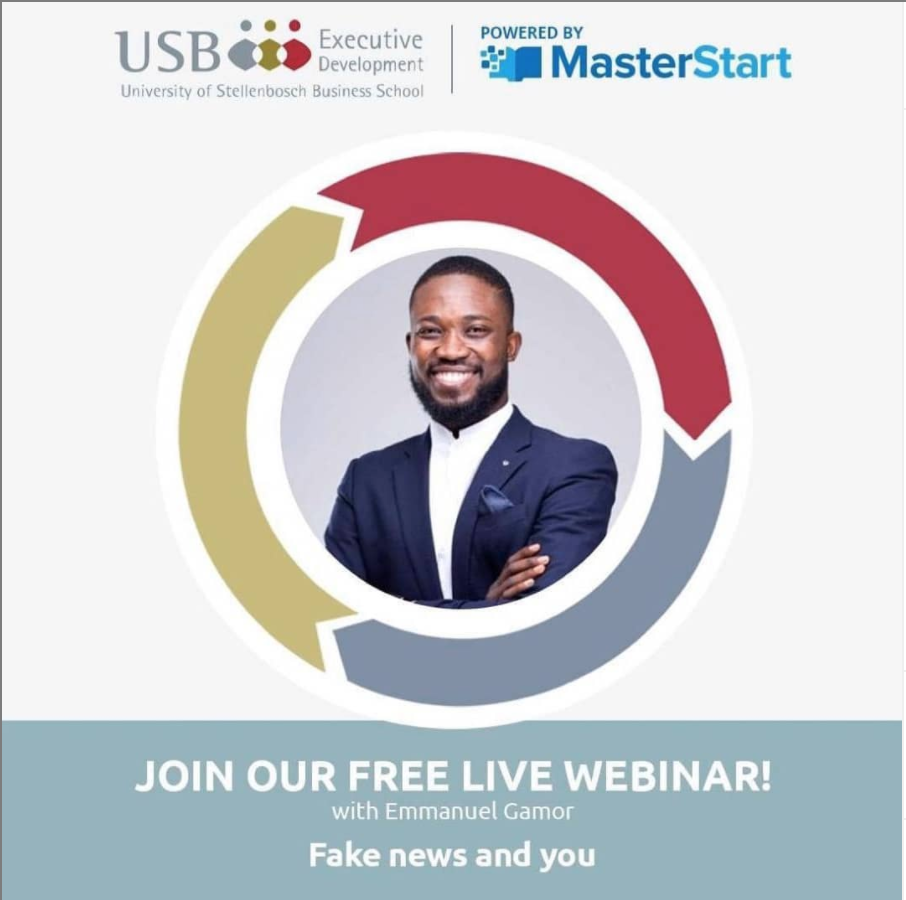Fake News & You

Digital Reputation Management with the University of Stellenbosch Business School Executive Education program in Sandton, South Africa. My colleagues and I are hosting a free webinar and I’m addressing, you guessed it, “Fake News & You” during this hyper-reliance on digital and social media use for our daily interactions. In a nutshell on April 21st at 2 pm SAST, I will make a case about your personal Digital Reputation and the tell-tale signs of reputable and well-established news sources with reputation-integrity and responsibility so we can sift through the false, the misinformation and the relevant in our daily lives. If this excites you or someone you know kindly
With the advent of social media and the ability of every smartphone owner to become a content producer, we are surrounded by more fake news, conspiracy theories, hoaxes, and misinformation than ever before. Worst of all, it can be tricky to determine which information is true and which is false.
As part of our #KeepLearning webinar series, we invited award-winning journalist and entrepreneur Emmanuel Gamor to speak to us about the rapid spread of fake news and how we can protect ourselves from damaging misinformation.
What it really comes down to is actively engaging with the content that you encounter, rather than simply absorbing information and taking it at face value.
1. Examine Reputational Integrity
The single most important thing that you can do to figure out if the information is reliable or not is to examine the source’s ‘reputational integrity’, i.e. its credibility.
You need to consider if the website/company that is publishing this information can be held accountable – do they have to answer to viewers, readers, and/or shareholders?
Accountability incentivizes content creators to fact-check their information and ensures that they are publishing only that which is legitimate. This way, if their article’s claims and statements are questioned, they can provide reliable sources and evidence to support their content – in good journalism, these sources will be cited in the article.
2. Build a Trusted Digital Community
Make an effort to limit your online community to people you trust, and who value truth and integrity. This includes friends and family members, but also extends to public figures, brands, politicians, celebrities, and influencers.
If someone is repeatedly sharing content that you believe to be false, misleading, or even harmful, consider calling them out on it, educating them as to why the information that they are sharing is incorrect, and explaining why spreading misinformation is problematic.
The goal is to surround yourself with people that you can rely on to share articles that they have fact-checked and determined to be credible.
3. Look for an Agenda
A clear indicator that information may be unreliable is that it appears to be promoting a particular agenda. A great question to ask yourself is, “Is the purpose of this content to provide information, or has it been created to provoke an emotional response?”
When someone cannot back up their claims with reliable sources, studies, and facts, they will often rely on emotional, argumentative, and sensationalist tactics to convince people that their information is legitimate.
An excellent example of this is conspiracy theory videos – they often use emotionally-charged music, controversial statements, and flawed logic to manipulate you into believing their message. They may also try to appear more credible by emulating the aesthetics of widely-trusted information providers such as news stations; for example, they might use similar fonts, color palettes, and music. This underhandedly predisposes you to be more receptive to their message and misinformation.
By actively implementing these steps and strategies in your daily social media browsing, you will be able to easily separate the lies from the truth and ensure that you remain properly educated and informed. We encourage you to share this information so that, together, we can build a world of truth, integrity, and authenticity.
To help you to #KeepLearning under lockdown, we have recorded all of our webinars and made them freely available for you to watch and share!
